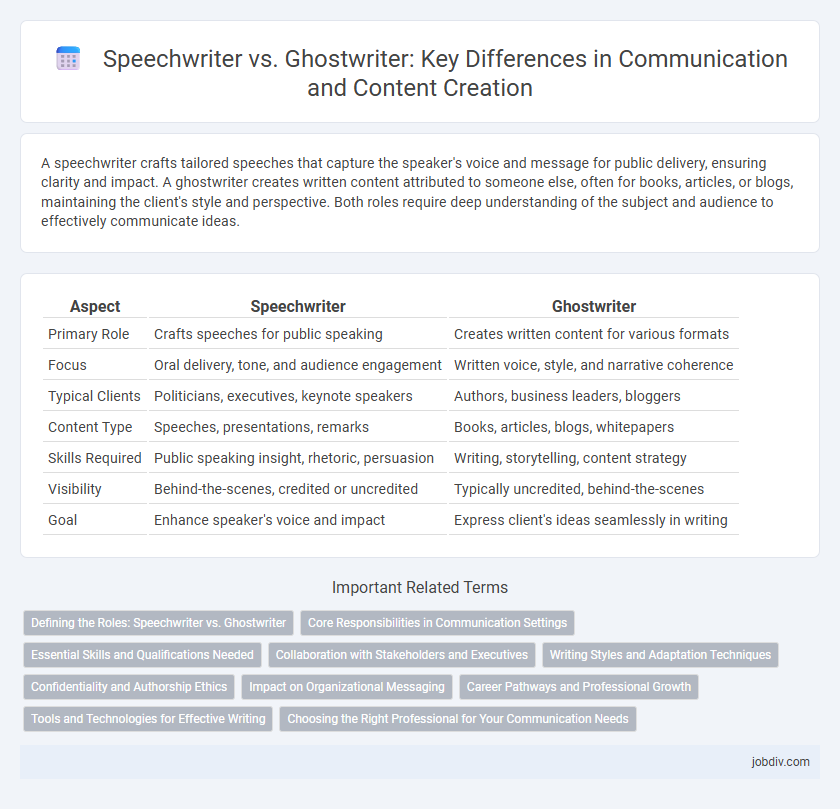A speechwriter crafts tailored speeches that capture the speaker's voice and message for public delivery, ensuring clarity and impact. A ghostwriter creates written content attributed to someone else, often for books, articles, or blogs, maintaining the client's style and perspective. Both roles require deep understanding of the subject and audience to effectively communicate ideas.
Table of Comparison
| Aspect | Speechwriter | Ghostwriter |
|---|---|---|
| Primary Role | Crafts speeches for public speaking | Creates written content for various formats |
| Focus | Oral delivery, tone, and audience engagement | Written voice, style, and narrative coherence |
| Typical Clients | Politicians, executives, keynote speakers | Authors, business leaders, bloggers |
| Content Type | Speeches, presentations, remarks | Books, articles, blogs, whitepapers |
| Skills Required | Public speaking insight, rhetoric, persuasion | Writing, storytelling, content strategy |
| Visibility | Behind-the-scenes, credited or uncredited | Typically uncredited, behind-the-scenes |
| Goal | Enhance speaker's voice and impact | Express client's ideas seamlessly in writing |
Defining the Roles: Speechwriter vs. Ghostwriter
A speechwriter specializes in crafting speeches tailored to the speaker's voice, purpose, and audience, ensuring persuasive and impactful delivery. A ghostwriter, on the other hand, creates various types of content--such as books, articles, or speeches--fully credited to another person, often maintaining the client's unique style and ideas. While both roles require strong writing skills and confidentiality, speechwriters focus exclusively on spoken word, whereas ghostwriters cover a broader content spectrum.
Core Responsibilities in Communication Settings
Speechwriters specialize in crafting tailored speeches that align with the speaker's voice, audience expectations, and communication objectives, ensuring impactful delivery in public or formal settings. Ghostwriters focus on creating written content, such as articles, books, or social media posts, that reflects the client's ideas and style while often remaining anonymous. Both roles require deep understanding of messaging strategy, audience engagement, and communication goals but differ primarily in format and public visibility.
Essential Skills and Qualifications Needed
Effective speechwriters possess exceptional public speaking awareness, deep understanding of audience psychology, and the ability to craft persuasive, memorable narratives tailored to specific events or leaders. Ghostwriters require advanced research skills, mastery of diverse writing styles, and the capability to capture the authentic voice of the client while maintaining confidentiality. Both roles demand expertise in language nuance, storytelling techniques, and adaptability across various communication platforms.
Collaboration with Stakeholders and Executives
Speechwriters collaborate closely with stakeholders and executives to capture the speaker's unique voice and deliver targeted messaging aligned with organizational goals, ensuring speeches resonate authentically with the audience. Ghostwriters, while also working with executives, focus more on producing polished written content that reflects the individual's viewpoints and style but may have less direct involvement in real-time feedback or iterative development. Both roles require strong communication skills and stakeholder engagement to effectively translate ideas into compelling narratives that support leadership objectives.
Writing Styles and Adaptation Techniques
Speechwriters specialize in crafting speeches that capture the speaker's voice, tone, and rhetorical style, ensuring the message resonates emotionally and maintains audience engagement. Ghostwriters adapt their writing style to various mediums and personalities, often producing polished articles, books, or content that reflects the client's unique voice without personal attribution. Both roles demand mastery in linguistic nuance and the ability to seamlessly mimic distinct communication styles for diverse audiences.
Confidentiality and Authorship Ethics
Speechwriters maintain strict confidentiality to protect the speaker's ideas while ensuring the speech reflects the speaker's authentic voice, prioritizing ethical authorship by attributing the content appropriately. Ghostwriters operate under complete anonymity, accepting that their contributions remain uncredited to preserve client privacy and maintain professional discretion in authorship ethics. Both roles require rigorous adherence to confidentiality agreements and ethical standards to safeguard intellectual property and uphold trust between writer and client.
Impact on Organizational Messaging
Speechwriters enhance organizational messaging by crafting tailored speeches that align with a leader's voice and strategic goals, ensuring clarity and emotional resonance. Ghostwriters support organizational communication by producing written content that maintains a consistent brand tone and message, often behind the scenes, enabling seamless storytelling across platforms. Both roles are pivotal in shaping public perception and reinforcing key organizational narratives effectively.
Career Pathways and Professional Growth
Speechwriters typically follow career pathways in politics, corporate communications, or public relations, gaining expertise in crafting impactful messages for high-profile figures. Ghostwriters often work across diverse industries, including publishing, entertainment, and business, providing anonymity while shaping narratives and thought leadership content. Both roles offer professional growth through expanding specialized writing skills, networking with influential clients, and enhancing persuasive communication abilities.
Tools and Technologies for Effective Writing
Speechwriters leverage specialized tools like teleprompters, speech analysis software, and AI-driven content optimization platforms to craft compelling and audience-tailored speeches. Ghostwriters utilize advanced writing software, plagiarism checkers, and collaborative cloud-based tools such as Google Docs and Scrivener to ensure seamless content creation and confidentiality. Both professions increasingly adopt machine learning algorithms and natural language processing technologies to enhance linguistic precision and stylistic consistency in their writing processes.
Choosing the Right Professional for Your Communication Needs
A speechwriter specializes in crafting speeches tailored to the speaker's voice, audience, and purpose, ensuring effective verbal communication and engagement during presentations, conferences, or public events. In contrast, a ghostwriter produces written content on behalf of clients, often for books, articles, or blogs, maintaining the client's style and message without public credit. Selecting the right professional depends on whether your communication goal involves live delivery or published material, requiring precise alignment with your intended medium and audience impact.
Speechwriter vs Ghostwriter Infographic

 jobdiv.com
jobdiv.com